Farrakhan delivers stirring truth at Tenn. State University
By Ashahed M. Muhammad -Asst. Editor- | Last updated: Nov 9, 2012 - 9:39:39 AMWhat's your opinion on this article?
‘Without you, we are lost’
Min. Farrakhan delivers stirring truth as students overcome opposition, and hold successful conference to address challenges faced by HBCUs
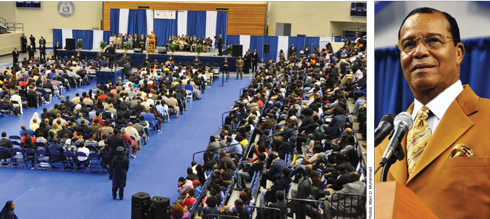
Nearly 3,000 filled the Gentry Complex on the campus of Tennessee State University to hear Minister Farrakhan November 2. Photos: Marc D. Muhammad
|
NASHVILLE - College students from across the country gathered at Tennessee State University for the first Collegiate Black United Summit International conference October 31 to November 2.
Because of the difficulties caused by Superstorm Sandy, student leaders from parts of the East Coast were unable to make the trip, however, many others did, and enjoyed the three-day summit featuring the Honorable Minister Louis Farrakhan.

|
The Minister got right to work speaking to approximately 30 student leaders on Nov. 1 at the Loews Vanderbilt Hotel. He was also the keynote speaker wrapping up the conference Nov. 2 at the Gentry Complex on TSU’s campus.
Min. Farrakhan discussed the reasons many university officials and outside organizations work to prevent him from speaking to Black students on college campuses, even though he pays expenses for all of his staff and does not ask for an honorarium.
“My purpose for coming, at my own expense, is to talk to you,” said the 79-year-old Muslim leader. “I’m not a young man, and as an older man starts going down into the valley of death, he wants to know what is coming behind him, that will make his living not in vain.”
“If we lose you, we have no future. That’s how important you are to the future of our people and that’s why they have made it very difficult for Louis Farrakhan to come to speak to young Black students,” he added.
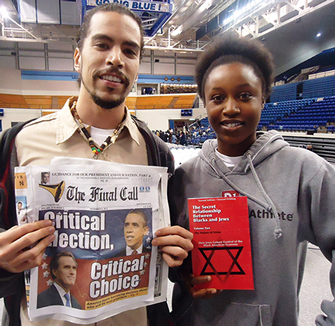
Kendal Patton and Renada Lee, both students at Middle Tennesse State University, enjoyed the Minister’s message.
|
The Minister told students that their DNA makes them “natural builders,” but Blacks have failed to build a future for themselves. “You should know and appreciate the fact that your ancestors were not running around in Africa with bones in their noses swinging from trees. Your ancestors were the builders of civilization,” he told the students. “The White slave masters did not build the fine mansions throughout the South.”
The sacrifices of many leaders and the parents of those enrolled in college should not be in vain, said Min. Farrakhan. And the learned ones in the Black community must use their knowledge to develop solutions to the problems that plague the community, he added.
Social engineering has kept the Black masses relegated to America’s underclass, however, the Minister told the young students, if they listened to his guidance, it was possible to change the collective Black condition.
Although many of the students were small babies when the Million Man March took place in 1995, the historical perspective was important to hear. The Minister has been working among Black people for 57 years, and it did not happen by accident.
“Students, reason with me,” Min. Farrakhan pleaded. “What kind of man … can make a call for one million men and nearly two million men show up on the Washington Mall? It never has happened in the history of America or anywhere else in the world. What kind of brother is this seated before you that God would allow me to make a call to Black men and they respond to me in the most peaceful demonstration ever held on the Washington Mall?”
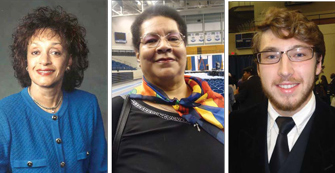
(L-R) Dr. Portia Shields, TSU president, Dr. Jane Davis, TSU English professor, Brayden Letwin, 20, TSU student
|
“What message did that send to the oppressor?” he asked. “Two million men is an army. There are great nations on our planet that do not have an army of two million men.”
Minister Farrakhan shared how he was angered after learning about obstacles student organizers faced to bring him to campus. Previously he was banned along with all representatives of the Nation of Islam.
“We pay our own way just to see you. Either we are crazy, or you are extremely valuable, and the enemy wants to keep you in a state where you will continuously be dependent on others rather than dependent on God and yourselves,” said the Minister. “What is it about Farrakhan that before I come, they come in advance and tell you things about me that would frighten you or make you not even want to listen to me?”
“You all are innocent,” he told the students, “your leaders are guilty.”
The future of HBCUs
Spearheaded by Het-Heru Sorority, Incorporated and the Nation of Islam Student Association on TSU’s campus, conference attendees focused on examining the overarching challenges facing HBCUs such as shrinking enrollment, financial shortfalls and accreditation struggles.
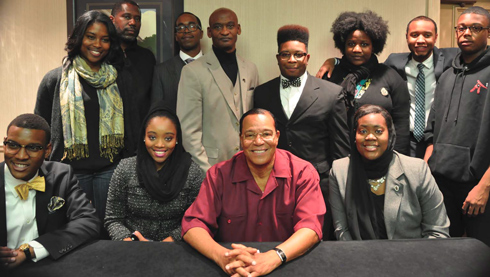
Minister Farrakhan (center) with young students, sponsors and organizers after speaking to them Nov. 1. Photo: Marc D. Muhammad
|
Although many Black students upon graduating high school are intrigued and initially drawn to the idea of attending a Black institution, they are often told by high school counselors that an HBCU education is substandard, and would not prepare them adequately for the workforce. Yet, the number of White students at HBCUs nationwide appears to be growing with some HBCUs considering merging with predominately White institutions. For example, Bluefield State College and West Virginia State University are classified as HBCUs, but actual Black enrollment hovers around 15 percent. Other HBCUs are woefully underfunded with crumbling buildings and lagging behind technologically.
TSU is in the midst of implementing a 2011-2015 “Access and Diversity Plan” which has as a portion of its mission: “Articulating and evaluating race-neutral strategies to achieve institutional access and diversity goals, while identifying and supporting new and innovative methods of using access and diversity funds.” According to recent findings by the U.S. News and World Report, TSU’s population is 62 percent female and 38 percent male with only a nine percent four-year graduation rate. Twenty-two percent of its campus population is White. This was easily observable on campus, as many Whites casually strolled across the yard, and were seen in the Gentry Complex ostensibly participating in TSU’s vaunted athletic program.
Overcoming obstacles at TSU
A little over 9,100 students are enrolled at Tennessee State University, a land-grant university founded in 1912. After its organization in 1909 as the Agricultural and Industrial State Normal School, the institution became a four-year teachers’ college in 1922, was elevated to full land-grant university in 1958 then merged with the University of Tennessee at Nashville in 1979.
Organizers said after Min. Farrakhan’s tour of Black colleges in the early spring, they were inspired to take ownership and responsibility for the quality of their education, the conditions found on their campuses and within their communities. The Minister’s April trip to Nashville to address students from TSU and Fisk University was the spark that lit the flame. Though TSU officials prevented him from speaking on campus, an enthusiastic standing-room only crowd of over 1,200 turned out to hear his message at Jefferson Street Missionary Baptist Church.
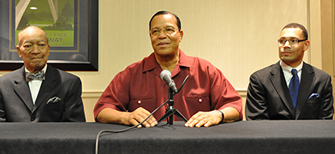
(L-R) Abdul Majeed Muhammad of Muhammad Mosque #60 in Nashville, Minister Farrakhan and Samuel X, NOISA president at TSU.
|
Unlike the Minister’s most recent Black college visits, TSU president Dr. Portia Shields did not meet with the Minister, nor attend the speech. Recently, Southern University’s chancellor greeted the Minister and watched the entire message, the president of Johnson C. Smith University in Charlotte, N.C., greeted the Minister and met with him and the president of Bowie State University in Maryland also met with the Minister and watched his entire speech.
Despite the seemingly cooperative words from her office, Dr. Shields offered no real support and administrators apparently set up more bureaucratic, legal and financial hurdles making this appearance by the Minister difficult, and it appears a new battlefield has been opened up in efforts to keep him from speaking to Black college students nationwide.
Minister Farrakhan delivered a thought-provoking message to nearly 3,000 that filled the Gentry Complex Nov. 2. BUSI organizers were happy with the turnout and the spirit of those who came to hear the Minister. An Internet webcast viewing party was held at Alabama A&M University in Huntsville as well as numerous locations across the United States and internationally.
Braun Wright, a 21-year-old TSU student originally from New Jersey, said her mind was partially on her family and friends on the East Coast suffering from damage caused by Superstorm Sandy. As vice-president of Het-Heru Sorority, Inc., and a primary organizer for the conference as well as the Minister’s appearance in April, she said the organization again received the “runaround” dealing with requisitions, and suspicious disappearances of podiums, tables and chairs from Pogue Auditorium, the site of the BUSI summit’s panel discussions. They were either stolen or removed by facilities employees, and therefore, unable to be used on Nov. 2 when Minister Farrakhan was to speak.
“It’s been a long tiring journey, we’re here now, but work still needs to be done,” said Ms. Wright. “Watch and listen because (this conference) is not just important for HBCUs but for Black people in general. We have to understand each other’s struggle no matter where we come from.”
As a student organization, Het-Heru is authorized to use campus facilities, which are typically covered by fees paid by the students who attend the university, said Ms. Wright. The students said they were told by the university president that the fees would be covered. However, a few days later, organizers were surprised when told by TSU’s legal and administrative officials that the president made a commitment unaware that a new policy and procedure had been put in place, students said.
The fees for cleanup and preparation of the venue would be added, as well as additional insurance and security fees totaling nearly $10,000, said student leaders.
Brother Samuel X, a graduate student, and head of the Nation of Islam Student Association at TSU took out a loan for $5,000 in order to cover the surprise costs now tacked on to a free event. A public collection was raised from those who attended the Nov. 2 message and Minister Farrakhan generously agreed to cover any additional costs to ensure that neither Samuel nor the sponsoring organizations would go into debt.
Student leaders said the numerous legal and bureaucratic hurdles only strengthened their resolve to make the conference a success and ensure Min. Farrakhan had the opportunity to speak to the students. David Rawles, president of TSU’s Student Government Association told The Final Call he was unaware of the problems cited by representatives of Het-Heru and NOISA and called Minister Farrakhan’s words “powerful, motivational and inspirational.”
Brayden Letwin, a 20-year-old junior majoring in film production, said though he came late, the Minister’s words were interesting. Though White, he wasn’t afraid to attend the event and loves going to an HBCU. “Honestly I love it. I’m originally from Canada and I moved out here and went to a very country high school and got to experience ignorance, the exact opposite of what this is, then I came here and it was reviving,” added the student.
After the conference, Brother Samuel X, who also attended undergrad at TSU, didn’t want to make a big deal out of the loan, or his efforts to bring the Minister to campus. He just wanted everyone to have the chance to hear from his teacher.
“All I was trying to do was get him on campus, to make sure the campus community—the students most importantly—could hear the man that changed my life,” Samuel X told The Final Call. “My plans are to take his words, take the movement and implement it, put it into action. There are students that think just like I do that want to see us benefit from the educations that we are supposed to be getting—take it and become productive. I want to be seen as nation-building and that is what we plan to do.”
Dr. Jacqueline Mitchell, a professor in the communications department at TSU, said she would not have missed this message for the world.
“I am grateful that our students could come and at long last have the opportunity to hear him,” said Dr. Mitchell. “He certainly inspires the female student to take pride in herself and the male student to treat her with pride, but I think it also allows our students to learn about their origins and their history and that’s very important to take pride in yourself, to value your education so that when you do finish you go out in the world and create opportunities for others.”
Dr. Jane Davis, an associate professor of English at TSU, said what happened to the student organizers did not surprise her. She has had her own run-ins with TSU president, whom she called “a dictator,” characterizing her administration as a “reign of terror.” She credits the Minister’s words during his visit in April with saving the TSU Africana Studies program.
“I hope he knows how incredibly important his visits here have been because we have been living in a state of terror under this current administration,” said Dr. Davis. “The speech that he gave in April, the day after, I got calls from the administration because I was the head of the faculty senate curriculum committee—I got calls to immediately send the approval to create a minor in Africana Studies because the administration was simply going to make it a concentration. The minute after Minister Farrakhan came, I got phone calls and e-mails from the administration. They could not have cared less before.”
She said his presence Nov. 2 was “a godsend” in challenging the Board of Regents, TSU’s president and “her cronies.”
“The kind of puppetry that he talked about in April is still going on,” Dr. Davis added.
Following the message, Renada Lee, a student at Middle Tennessee State University originally from St. Louis, smiled as she tightly gripped her copy of The Secret Relationship Between Blacks and Jews, Volume 2.
“I’m still mentally digesting everything he said,” Ms. Lee told The Final Call. “Every sister and brother should be open and awakened to what he is talking about. They need to put aside their conditioning in terms of the religious aspects because they always assume he is talking about religion—no—he’s talking truth, about uplifting Black people and lifting us out of a state that we know that we shouldn’t be in.”
Kendal Patton, a 22-year-old philosophy major also from MTSU, enjoyed Minister Farrakhan’s message. It seems like the administration tried to keep the Minister’s appearance on campus “low key,” he said.
“I thought it was deep and he touched on a lot of relevant issues. I feel like there’s a lot to gain from hearing him and I can see why White supremacist structures would want to try to keep something like this kind of low key, because there were very few flyers around advertising this.”
During a Nov. 1 question and answer period, Joshua Harris, a 22-year-old senior elementary education major and premier consul of the X Assembly at Morgan State University, apologized to the Minister for negative opinions adopted after his young Jewish friend spoke negatively of Minister Farrakhan when the boys were 12 or 13 years old in his hometown of Cincinnati. Mr. Harris said he learned to “never judge a book by its cover, and to do your own research.” After hearing from the Minister, the man was nothing like his young Jewish friend had led him to believe, said Mr. Harris. His Jewish friend called the Minister a “Jew basher” and said the Nation of Islam was to blame for the death of Malcolm X.
“The skewed opinion that I came in with before meeting with him and listening to him has very much changed and I would say flipped in reverse,” said Mr. Harris. “He is not anti-Semitic, he is interested in uplifting Black people and is completely against those who are opposed to that and from what I heard last night, that is not all Jews, but the leaders of the Jewish community who are taking advantage of the God-given talents that Black people have in this country.”
Chinedu Nwokeafor, a 20-year-old speech communication major and auxiliary consul for the X-Assembly at Morgan State University, was visibly moved throughout the entire conference. He said the Minister’s words resonated with him tremendously. Everything he had heard previously about the Minister was negative, but his one-on-one interaction, which included the Minister bringing him out on stage to make a point regarding the origin of man, changed his life.
Mr. Nwokeafor said as a Catholic, he heard many of the things the Minister referenced from scripture before, however, the way the Minister talked about it “opened his eyes.” Things he heard for years now made sense.
“His words are just centrifugal and life-changing. It was amazing,” said Mr. Nwokeafor. “He eloquently referenced Jesus Christ numerous times, he referenced Jesus Christ more than he referenced Muhammad and that was very interesting. It actually made me really think about how Christianity—we are not as open-minded as we would like to think.”
(To purchase a DVD, CD or MP3 of the Honorable Minister Louis Farrakhan’s message delivered at Tennessee State University November 2, visit http://store.finalcall.com.)
INSIDE STORIES AND REVIEWS
-
-
About Harriett ... and the Negro Hollywood Road Show
By Rabiah Muhammad, Guest Columnist » Full Story -
Skepticism greets Jay-Z, NFL talk of inspiring change
By Bryan 18X Crawford and Richard B. Muhammad The Final Call Newspaper @TheFinalCall » Full Story -
The painful problem of Black girls and suicide
By Charlene Muhammad -National Correspondent- » Full Story -
Exploitation of Innocence - Report: Perceptions, policies hurting Black girls
By Charlene Muhammad -National Correspondent- » Full Story -
Big Ballin: Big ideas fuel a father’s Big Baller Brand and brash business sense
By Bryan Crawford -Contributing Writer- » Full Story






 Click Here Stay Connected!
Click Here Stay Connected!








